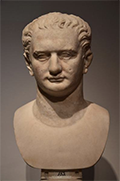The Roman Emperor Domitian
Domitian was a Roman emperor who ruled for 15 years in the 1st Century. He was a friend to the army and encouraged public spectacles at the Colosseum. Known as an extreme autocrat, he made many enemies and was assassinated by a group of them. 
He was born on Oct. 24, 51, in Rome. His father, Vespasian, and older brother, Titus, were both also future emperors. Titus enjoyed a classical education; Domitian did not, scraping by with an uncle in Rome. During the Year of the Four Emperors, he narrowly escaped death, running unseen from a temple burned by soldiers loyal to Vitellius. Prepared with little training to be emperor, he became so on Sept, 14, 81, after the death of his brother. The brothers were together at the time, and a few rumors circulated that Domitian had had a hand in his brother's demise. As emperor, Domitian set about rebuilding the city, some of which had been ruined in a recent fire. He ordered new construction, of a stadium and a temple to Jupiter the Guardian and even a performance hall. His personal preferences got the better of the royal treasury, and he ordered built two new royal residences, the Domus Augustuana and the Flavian Palace. A fan of public entertainment, he encouraged the continuation of chariot races and other spectacles at the Colosseum, finished in 80 by his brother. In fact, Domitian added the underground bit below the arena. Even more of the royal treasury contributed to a festival of gymnastics, horsemanship, and music. Two years into his reign, Domitian wanted to prove to the people that he was a military man and so went on campaign, in Germany. After a victory over the Chatti, he gave himself the title Germanicus. He proved to the Army that he had their welfare in mind when he became the first emperor since Augustus to give them a raise in salary. He had less success in Dacia, having to sign a peace agreement with King Decebalus. The power of the throne went to Domitian's head, and he ruled as a divinely inspired sole monarch. He declared that he was the sole entity of government. Sidelining the Senate (which despised him in return), he also declared that the head of government was wherever he was; in his later years, he spent much time outside of Rome. He even named two months after himself: Germanicus and Domitianus, which had been September and October. Jealous and suspicious, he recalled the popular Agricola, one of the conquerors of Britain, in order to stem the latter's popularity. The more he ruled, the more enemies he made. He used the power of his office to eliminate many of those enemies. He put down a senators' plot and quelled a German revolt but was unable to stop one more conspiracy. A bit of subterfuge enabled an assassin to get close enough to stab him with a dagger. When the first blow proved insufficient, the other members of the plot finished the job. He died on Sept. 18, 96; he was 44. He had married Domitia Longina, and they had had a son, who died in infancy. Succeeding Domitian was an advisor, Nerva.
|
|
Social Studies for Kids
copyright 2002–2026
David White




